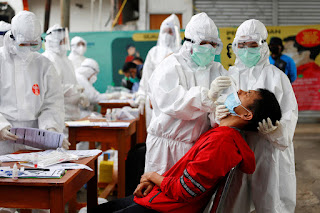Impact of Corona virus on Sri Lanka 🦠💉😷
 The COVID-19 pandemic in Sri Lanka is part of the ongoing worldwide pandemic of coronavirus disease 2019 (COVID-19) caused by the severe acute respiratory syndrome coronavirus 2 (SARS-CoV-2) virus. The first case of the virus in Sri Lanka was confirmed on 27 January 2020, after a 44-year-old Chinese woman from Hubei, China, was admitted to the Infectious Disease Hospital in Angoda, Sri Lanka.As of 1 September 2021, a total of 462,767 COVID-19 cases had been recorded in the country, 386,509 patients had recovered from the disease, and 10,140 patients had died.
The COVID-19 pandemic in Sri Lanka is part of the ongoing worldwide pandemic of coronavirus disease 2019 (COVID-19) caused by the severe acute respiratory syndrome coronavirus 2 (SARS-CoV-2) virus. The first case of the virus in Sri Lanka was confirmed on 27 January 2020, after a 44-year-old Chinese woman from Hubei, China, was admitted to the Infectious Disease Hospital in Angoda, Sri Lanka.As of 1 September 2021, a total of 462,767 COVID-19 cases had been recorded in the country, 386,509 patients had recovered from the disease, and 10,140 patients had died. The first reported case involving a Sri Lankan outside the country was reported in Italy on 3 March 2020. As of 23 March 2020, forty-five quarantine centres had been built in the country by the Sri Lanka Army as a preventative measure in an attempt to stop the spread of the pandemic.Nearly 3,500 people were placed under quarantine in 45 quarantine centres, including 31 foreigners from 14 countries. As of 25 March 2020, Sri Lankan authorities tracked down over 14,000 people who had come into contact with identified patients, and ordered those people to self-quarantine. As of 16 April 2020, Sri Lanka was named the 16th highest-risk country for contracting the virus. In April 2020, Sri Lanka's response to the pandemic was ranked as the 9th best in the world.
The first reported case involving a Sri Lankan outside the country was reported in Italy on 3 March 2020. As of 23 March 2020, forty-five quarantine centres had been built in the country by the Sri Lanka Army as a preventative measure in an attempt to stop the spread of the pandemic.Nearly 3,500 people were placed under quarantine in 45 quarantine centres, including 31 foreigners from 14 countries. As of 25 March 2020, Sri Lankan authorities tracked down over 14,000 people who had come into contact with identified patients, and ordered those people to self-quarantine. As of 16 April 2020, Sri Lanka was named the 16th highest-risk country for contracting the virus. In April 2020, Sri Lanka's response to the pandemic was ranked as the 9th best in the world. Although Sri Lanka was successful in handling the first wave of the pandemic, the government's failure to handle the second and the third waves of the pandemic have caused a spike in COVID-19 deaths since November 2020. There was a sudden increase in COVID-19 cases after the relaxation of health restrictions during the Sinhala and Tamil New Year in April 2021. The highly contagious Delta variant has been responsible for the considerably high fatality rate in the country since August 2021. As of August 2021, Sri Lanka became the country with the fourth-largest number of daily deaths in the world by population just behind Georgia, Tunisia, and Malaysia. Government negligence in implementing a lockdown, negligent behaviour of the general public, and teachers' protests have all contributed to the record spike of COVID-19 cases and deaths in the country.




Dangerous Virus 😶😶😶
ReplyDelete